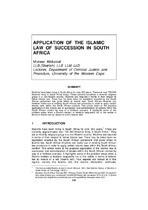| dc.contributor.author | Abduroaf, Muneer | |
| dc.date.accessioned | 2021-05-25T13:55:59Z | |
| dc.date.available | 2021-05-25T13:55:59Z | |
| dc.date.issued | 2020-10 | |
| dc.identifier.citation | Abduroaf, M. (2020) Application of the Islamic Law of Succession in South Africa. 41:2 Obiter pp. 396-409. doi:10.17159/obiter.v41i2.9159 | en_US |
| dc.identifier.uri | DOI: 10.17159/obiter.v41i2.9159 | |
| dc.identifier.uri | http://hdl.handle.net/10566/6195 | |
| dc.description.abstract | Muslims have been living in South Africa for over 300 years. There are over 750 000 Muslims living in South Africa today. These persons constitute a minority religious group in a non-Muslim country. Muslims are required in terms of their religion to follow Islamic law. There has (to date) been no legislation enacted by the South African parliament that gives effect to Islamic law. South African Muslims can however make use of existing South African law provisions in order to apply certain Islamic laws within the South African context. This article looks at the practical application of the Islamic law of succession and administration of estates within the South African context by way of a fictitious scenario. It highlights some of the problem areas when a Muslim testator or testatrix bequeaths his or her estate in terms of Islamic law by means of a will (Islamic will). | en_US |
| dc.language.iso | en | en_US |
| dc.publisher | Researchgate | en_US |
| dc.subject | Minority group | en_US |
| dc.subject | South Africa | en_US |
| dc.subject | Muslims | en_US |
| dc.subject | Islamic Law of Succession | en_US |
| dc.title | Application of the Islamic Law of Succession in South Africa | en_US |
| dc.type | Article | en_US |

